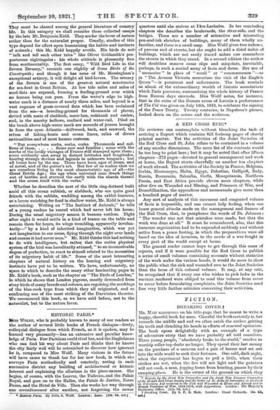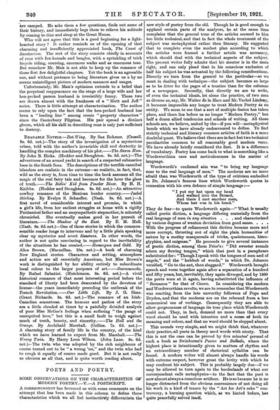FICTION.
BREAKING COVER.t
Mn. Mies announces on his title-page that he means to write• a happy, cheerful book for once. Cheerful the book certainly is, but towards the middle and end we often catch the author gritting his teeth and clenching his hands in efforts of renewed optimism. The book opens delightfully with an example of a typo of adventure story that we have probably all told ourselves. Three young people, " absolutely broke to the world," resolve to worship roller-top-desks no longer. They-spend their last money on the purchase of a caravan and a pair of horses and set out into the wide world to seek their fortunes. One cold, dark night, when the experiment has begun to pall a little, when their clothes are wet, when the fire will not light and the potatoes will not cook, a man, jogging home from hunting, passes by their camping-place. He is the owner of the ground on which they • Reports by the Joint War Committee and the Joint War Finance Committee of the British ea Cross Society and the Order of St. John of Jerusalem in England on Voluntary Aid rendered to the Sick and Wounded at Home and Abroad and to British Prisoners of War, 1914-1919, with Appendices. London: Me Malestra Stationery Office. [12a. 6d. net.] t Breaking Cover. By S. P. B. Male. London : Grant Aleharde. DX 6d. natj
are camped. He asks them a few questions, finds out some of their history, and immediately begs them to relieve his solitude by coming to dine and sleep at the Great House.
Who will not agree that this is a good beginning for a light- hearted story ? It rather reminds us of the opening of that charming and insufficiently appreciated book, The Court of Saccharissa. The rest of the story consists chiefly in accounts of rams with fox-hounds and beagles, with a sprinkling of trick bicycle riding, coursing, enormous walks and as enormous teas. But somehow Mr. Mais is not able to keep up the romance of those first few delightful chapters. Yet the book is an agreeable one, and without pretence to being literature gives us a by no means unintelligent picture of modern manners and usages.
Unfortunately, Mr. Mais's optimism extends to a belief that the perpetual reappearance on the stage of a large wife and her hen-pecked parson husband is irresistibly funny. These two are drawn almost with the frankness of a " Mutt and Jeff " series. There is little attempt at characterization. The author seems to rely upon the fact that the hen-pecked husband has been a " leading line " among comic " property characters " since the Canterbury Pilgrims. His pair spread a distinct gloom, which all his skill in describing runs is only just sufficient to destroy.



































 Previous page
Previous page